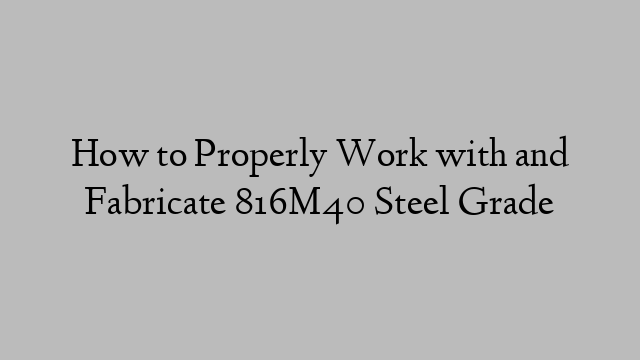Address
304 North Cardinal St.
Dorchester Center, MA 02124
Work Hours
Monday to Friday: 7AM - 7PM
Weekend: 10AM - 5PM
Address
304 North Cardinal St.
Dorchester Center, MA 02124
Work Hours
Monday to Friday: 7AM - 7PM
Weekend: 10AM - 5PM

The 816M40 steel grade is a low alloy steel with high tensile strength and good toughness, making it suitable for a variety of engineering applications. When working with and fabricating this steel grade, it is important to consider its mechanical properties, chemical composition, and proper handling techniques to ensure the best results.
Mechanical Properties:
– Tensile Strength: 850-1000 MPa
– Yield Strength: 650 MPa
– Elongation: 16%
– Hardness: 248-302 HB
These mechanical properties make 816M40 steel grade suitable for applications that require high strength and good impact resistance.
Chemical Composition:
– Carbon (C): 0.36-0.44%
– Manganese (Mn): 0.75-1.00%
– Silicon (Si): 0.10-0.35%
– Phosphorus (P): 0.035% max
– Sulphur (S): 0.040% max
– Chromium (Cr): 0.90-1.20%
– Molybdenum (Mo): 0.15-0.25%
Proper Work and Fabrication Techniques:
1. Cutting and Machining: 816M40 steel grade can be machined using conventional methods, but a low cutting speed and sufficient cooling are recommended to avoid overheating and work hardening.
2. Welding: Preheating and post-weld heat treatment are recommended to prevent cracking and ensure good weld integrity. Suitable welding methods include arc welding, MIG welding, and TIG welding.
3. Heat Treatment: Annealing, normalizing, and tempering can be used to achieve the desired mechanical properties for specific applications.
4. Forming and Forging: 816M40 steel grade can be hot formed and forged at temperatures between 850-1100°C.
It is important to follow the manufacturer’s recommendations and industry best practices when working with and fabricating 816M40 steel grade to ensure optimal performance and structural integrity in the finished product. Always wear appropriate personal protective equipment and follow safety guidelines when handling and fabricating steel materials.
816M40 Steel grade
1699617793